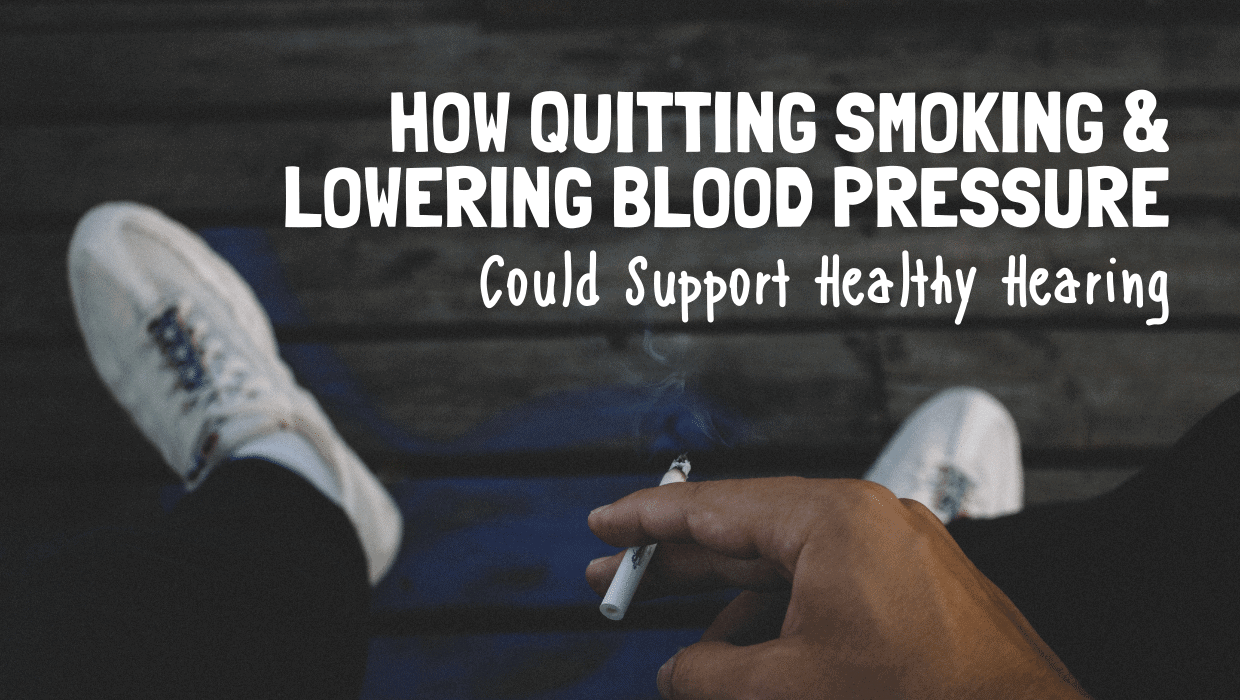
Your hearing health is easily affected by your overall health and wellbeing. All the parts of your body work together, and if you have any health issues, other parts of your body will be affected as well. You probably know that age is linked to hearing loss, and exposure to noise can damage your hearing. But did you know that both smoking and high blood pressure can lead to hearing loss? Quitting smoking and lowering your blood pressure could support healthy hearing.
Smoking Leads to Hearing Loss
It’s well known that smoking has a lot of health risks. It increases your risk of cancer, heart disease, and diabetes. It can even increase your risk of hearing loss. People who smoke regularly are 60% more likely to have hearing loss than non-smokers. Even people who live with a smoker and are exposed to second-hand smoke are more likely to suffer from hearing loss. Another study found that teenagers who smoke or are exposed to smoke are twice as likely to develop a hearing loss. Smoking is also tied to higher rates of tinnitus and vertigo!
How Smoking Affects Your Ears
How does smoking lead to hearing loss? Regularly smoking leads to significantly lower levels of oxygen in the blood. It also constricts blood vessels throughout your body and affects your overall health and wellbeing. The lower levels of oxygen in the body can easily hurt the delicate cells in your inner ear. When these cells don’t get enough oxygen, they can be damaged or even die. When this happens, you’ll experience hearing loss.
Smoking cigarettes can also damage the auditory nerve and can irritate the lining of the Eustachian tube that connects the back or your throat to your middle ear. Smokers have more ear infections than non-smokers, and this can also damage hearing. Smoking is also thought to make your ears more sensitive to very loud sounds, and increase your risk of noise-induced hearing loss.
How High Blood Pressure Affects Your Ears
Smoking isn’t the only risk factor that leads to increased rates of hearing loss. Millions of Americans have high blood pressure, or hypertension. High blood pressure is when the blood pressure in your arteries is very high, and your heart has to pump very hard to move blood through the arteries. This puts a lot of strain on your heart. The heart is working much harder than normal to send blood through the body. Having high blood pressure increases your risk of heart disease, heart failure, or a stroke. It also increases your risk of hearing loss.
When you have high blood pressure, the heart is working hard, and the blood vessels are under a lot more strain. Blood vessels throughout your body, including in your ears, are more likely to get damaged. When the blood vessels in your ear are damaged, you’re more likely to experience hearing loss.
Supporting Healthy Hearing
When you quit smoking, you’ll be doing the right thing for your ears. Even 20 minutes after your last cigarette, your blood pressure will decrease. Circulation will start to improve, and your cells will start receiving more oxygen. After a few hours, your oxygen levels will return to normal. After a couple of days, your sense of taste will also improve, and your sense of smell will be stronger.
Lowering your blood pressure is also good for your hearing health. Maintaining a healthy body weight, exercising regularly, and eating a healthy diet will lower your blood pressure, and lower your risk of hearing loss.
Treating Hearing Loss
You can’t undo the damage to your ears that was caused when you were smoking. However, quitting smoking and lowering your blood pressure is the first step in supporting healthy hearing. This will prevent further damage due to smoking or high blood pressure. Next, think about treating hearing loss. If you’ve never had a hearing test, this is a great time to schedule your first hearing test and learn more about your hearing health.
